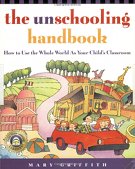After home schooling my children (we’re up to nine now) for twelve years, I think I’ve heard nearly every question and comment on the subject that there is.
“But the schools are so good! Why would you do such a thing?”
“What about socialization? How will they make any friends?”
“How on earth do you think you can teach chemistry?”
Sometimes I’m questioned because a person is curious. Other times it’s because of genuine concern for my children. And then there is sheer nosiness. But they always seem to boil down to these three themes:
Why home school?
The short and simple answer is that I was jealous of my time with my daughter. I loved watching her learn and I didn’t want someone else to have that joy. I was unwilling to give my daughter’s best hours to someone else and be left with the dregs. The longer we home school, the more I enjoy my children. I like who they are and I enjoy the freedom homeschooling allows us to pursue interests and still have time together as a family.
 What about friends?
What about friends?
Everyone asks about socialization, as if attending school is the only place to make friends. But just because my children do not learn in a school building does not mean that they miss out on these things. My children make friends the same way adults do: through the things they’re involved in and where they live. They take classes, attend our church, play with neighbors, perform with a local theater group, belong to scouting organizations, and do volunteer work. Their social lives are not lacking. If anything, I find I need to rein them in every now and then.
Algebra? Chemistry?
I’ve had people wonder how I can teach all the different ages I have. This year it’s preschool through 12th grade. Well, I don’t teach everything all the time. Home schooling often involves learning in places and from people outside the home and family. For some subjects, we find other learning options: a class or a tutor or online resources. Our children’s education is tailored to them; each child can be challenged to reach their potential.
Many families on the North Shore home school their families; more, perhaps, than you realize. With many local, regional and statewide support groups, as well as resources, you can do some learning of your own about home schooling.
What do you think about home schooling? We want to know—please comment below. Are you intrigued by this educational alternative? Here are two books to read:

The Unschooling Handbook : How to Use the Whole World As Your Child’s Classroom
Mary Griffith

Homeschooling for the Rest of Us: How Your One-of-a-Kind Family Can Make Homeschooling and Real Life Work
Sonya Haskins
Want more info? Follow Elizabeth Curry’s blog.

